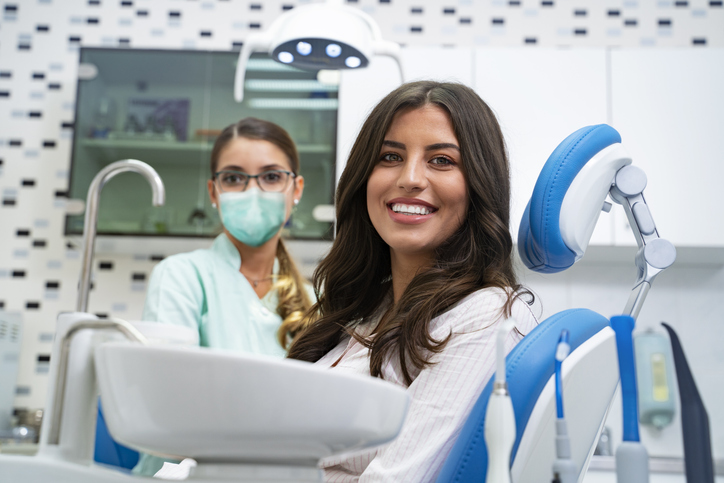
The general public associates COVID-19 with respiratory symptoms, such as difficulty breathing and a dry persistent cough. But the virus has been found in virtually every part of the body, including the mouth.
Recently, new data emerged from clinical practice showing that COVID-19 also has a deleterious effect on the oral cavity, causing a host of clinically significant symptoms. Dentists are noticing that patients with “long COVID-19” are experiencing tooth loss, greying gums, and tooth cracking alongside at a higher rate than usual.
For many, the question is why the disease appears to affect oral tissue so severely. So far, evidence suggests that it relates to the preponderance of ACE-2 receptors in the mouth targeted by the SARS-CoV-2 virus. The salivary glands, tonsils, and tongue carry more of the specific RNA-linked proteins that the coronavirus requires to infect cells, including specific enzymes that make it easier for it to penetrate the cell wall.
As a consequence, dentists are seeing more oral manifestations associated with COVID-19. Here’s a rundown.
Taste And Smell Loss
Loss of taste and smell were among the first identified symptoms of COVID-19. Doctors noticed that case-patients who tested positive would lose these senses early on, especially if their other symptoms were mild. Estimates suggest that the average prevalence of loss of taste among cases is around 38 percent.
The cause of loss of taste and smell in COVID-19 was originally thought to be the viral invasion of facial nerve cells. However, more recent studies cast doubt on that idea because of the absence of ACE-2 receptors in these tissues. Now the theory is that the virus infects susceptible cells surrounding the oral and nasal nervous system and this causes inflammation which then impacts patients’ sense capacities.
Cracked Teeth
Before the virus, the typical dentist might see one cracked tooth every other day. But with the onset of the pandemic, the number of patients with fractured teeth has risen significantly. Two visits per day are now the norm.
Dentists don’t believe that the virus is weakening teeth (although this remains a possibility). Instead, the current theory is that the stress of the pandemic is leading to more teeth grinding which, in turn, is leading to higher-than-usual levels of damage to dentition. COVID-19, looting, rioting, politics, and the general state of the nation has everyone on edge and unconscious bruxing is rising.
Gingival Tissue Breakdown And Oral Ulcerations
Evidence suggests that COVID-19 damages blood vessels across the body, including those that supply the mouth. And this could be leading to an increase in gingival breakdown and oral ulcerations.
The Angiogenesis Foundation – a group that works to uncover the mechanisms of cardiovascular disease – believes that the endothelial cells that line blood vessels are susceptible to SARS-CoV-2 because they carry the ACE-2 receptor. When the virus penetrates them, it damages them, depriving downstream areas of the body of oxygen. In the mouth, this process manifests as ulcerations and dying gum tissue. Generalized COVID-19-induced inflammation compounds the damage, worsening symptoms.
Dry Mouth
Pre-pandemic, dry mouth, or xerostomia, was a condition that dentists saw mainly in the elderly and smokers. Both age and tobacco use damage the salivary glands that keep the oral cavity moist. However, since the advent of the COVID-19 pandemic, more patients than usual are presenting with the condition.
Dry mouth is problematic because it causes bad breath and increases the rate of both cavities and oral infections. Saliva plays a vital role in the mouth, clearing away microbes and providing mild antiseptic action. When it is absent, the rate of oral health issues increases.
COVID-19 may be leading to an epidemic of dry mouth because of frequent mask use. Mouth breathing, evidence suggests, desiccates oral tissues, leading to halitosis and an increase in unhealthy bacteria.
Direct assault by the virus of salivary glands is a secondary mechanism. Data suggest that SARS-CoV-2 can enter salivary cells via the ACE-2 receptor, damage them, and cause them to produce less saliva than usual.
At present, the relationship between xerostomia and COVID-19 is poorly understood. Clinicians require more research to identify the causal mechanisms underlying the correlation. However, the rise in the prevalence of the condition is worrying for some, since in normal practice, dry mouth leads to an increase in both candida infection and caries.
Gingival Inflammation
Gingival inflammation typically occurs when bacteria in the oral cavity damage the gumline. Patients who fail to brush their teeth, for instance, often experience gum bleeding and damage to superficial tissues. And these problems get worse, the longer the oral hygiene hiatus lasts. However, many COVID-19 patients with excellent oral health practices are also experiencing gum problems.
Cytokines and interleukins – inflammatory signaling compounds – direct the immune system to target tissues afflicted by the SARS-CoV-2 virus, leading to redness and swelling. Since inflammation occurs across the whole body, it also adversely affects tissues in the mouth. And this, many researchers believe, is behind the rise of gingival inflammation.
Some patients experience severe inflammatory signaling dysregulation during COVID-19. Here, the body produces an abundance of cytokines and interleukins, inducing a “cytokine storm” as it attempts to direct the immune system to fight infection in multiple tissues. In small doses, inflammatory signaling compounds are helpful and marshal the body’s response to external threats. But in high quantities, they can be very damaging.
Regular periodontal disease causes elevated cytokine levels. Now evidence is emerging that the condition could also be contributing to cases where patients experience a cytokine storm, making the overall course of the disease worse.
Schedule An Appointment
The COVID-19 pandemic has been challenging for everyone. But it is also leading to a new raft of oral health problems.
If you’re concerned about your teeth and gums and would like a consultation, please schedule an appointment with Philadelphia Periodontist Dr. I. Stephen Brown. Solve any problems you may have and get peace of mind today!
